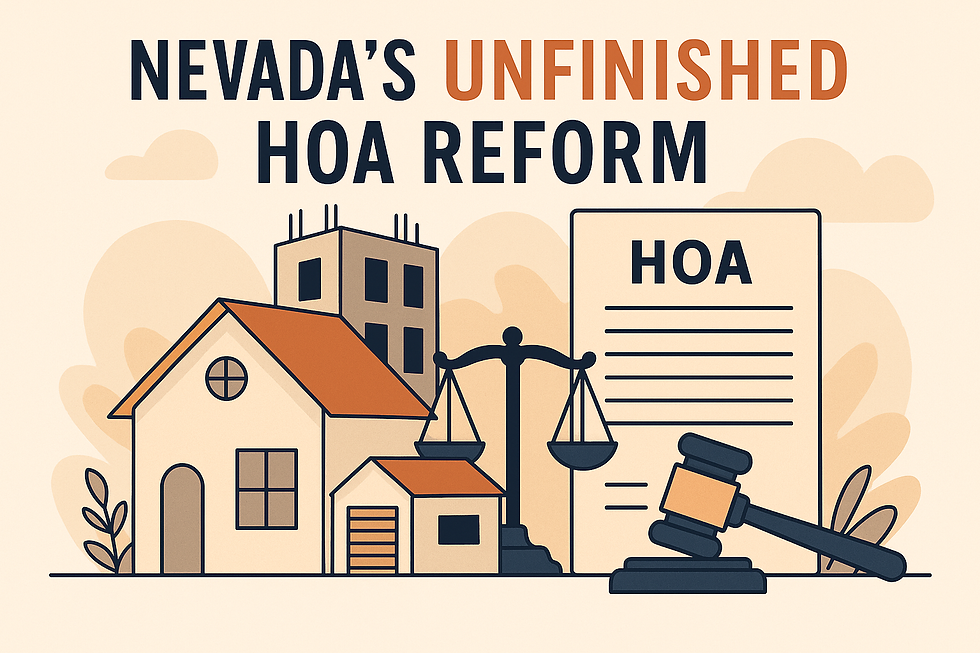When Conflict Becomes Control: How Ambiguity in Nevada Law Can Undermine HOA Boards
- Mike Kosor
- Oct 13, 2025
- 3 min read
When HOA Eligibility Rules Become Weapons
What if the very rules meant to ensure fair HOA elections could be twisted to silence the people they’re supposed to protect?
In Nevada, that’s already happening. Homeowners have been declared “ineligible” to run for or serve on their boards—not because they violated any clear law, but because the rules are vague enough to be bent by those in power.
Two statutes sit at the heart of the problem: NRS 116.31034, which governs board elections and eligibility, and NRS 116.31084, which outlines conflicts of interest. Both were intended to safeguard integrity in HOA governance. Yet in practice, their gaps have become tools for exclusion.
Inexplicably, NRED is aware and from all indications sits silent.
The Core Problem: Ambiguity + Authority Without Accountability
Subsection 10 of NRS 116.31034 bars anyone from serving on a board if they “stand to gain personal profit or compensation from a matter before the board.” Sensible in theory—but the statute never defines “personal profit,” “compensation,” or even what “stand to gain” means.
Does reimbursement for legal expenses count as compensation?[1] Does a homeowner lose eligibility simply for challenging an unlawful board decision in court? Some HOAs have said yes—and used that interpretation to disqualify candidates or sitting directors who question them.
That’s not how the law works.
Boards have no explicit statutory power to police eligibility or declare a seat vacant. NRS 116.3103 forbids directors from deciding matters in which they have a conflict; NRS 116.31036 gives only the membership the power to remove directors. Yet boards continue to act as judge and jury, often at their attorneys’ urging, without due process or independent review.
This gap allows HOA boards—sometimes just a handful of people—to declare a director's elected seat vacant, bypassing owners, due process, and any neutral review.
It’s not just undemocratic. It’s legally unsound.
The Declarant Loophole: Conflicted from the Start
Then there’s the problem of declarant-appointed directors—those named to the board by the developer before owners have full control.
Under current Nevada law, these appointees are seen by some to be exempt from recusing themselves in matters that benefit the very developer who employ or control them.
That means during the early years of your community’s life, the board might be filled with people who:
Work for the declarant;
Approve contracts with declarant-affiliated vendors;
Set assessments and budgets;
Control legal strategy—even against owners.
And they can vote on all of it—even when they or their employer stand to profit.
The system assumes they’ll recuse themselves voluntarily. But self-policing doesn’t work when a person’s paycheck or loyalty is tied to the party benefiting from the vote.
What NVHOAReform Is Asking For
In July 2025, NVHOAReform submitted a formal petition for rulemaking (see #4) to the Nevada Real Estate Division and the Commission for Common-Interest Communities. It asks for regulations to:
Clarify what constitutes “compensation” (albeit already defined in other Nevada law) and “personal profit” under NRS 116.31034(10);
Clarify who has the authority to determine ineligibility under subsection 13—and mandate due process;
Presume material conflicts of interest exisit for declarant-appointed directors in matters involving direct declarant benefit (e.g., contracts, assessments, legal disputes) and establish clear rules;
Restrict the award of a contract to an affiliate or the delcarant during the declarant control period, unless waived by the Division under a transparent review.
These aren’t radical ideas—they’re basic guardrails found in corporate boards, nonprofit governance, and public agencies. They ensure that no one—developer, manager, or entrenched board—gets to rig the system to protect their own interests. Find all NVHOAReform petitions here.
What You Can Do
If you’re a homeowner, director, or advocate:
Read the full petition when it’s posted on our site;
Contact the Real Estate Division and ask them to support clear, enforceable rules;
Share your story if you’ve seen disqualifications or declarant influence used to suppress owner voices.
Until these gaps are closed, Nevada’s HOA law will keep protecting the few at the expense of the many. Homeowners deserve fair rules—and the right to serve without fear of retaliation.
Let’s change that.
_________________________
[1] NRS 281A.070 does defines “Compensation” [to] mean[s] any money, thing of value or economic benefit conferred on or received by any person in return for services rendered, personally or by another.
[2] Nevada law does provide the CICCH Commission authority to remove a director under critain circumstances.




Comments